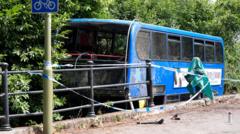What Happened in the West Bank Village Where Three Palestinians Were Killed?

Understanding the Escalating Tensions in the West Bank: A Closer Look at Recent Violence
The conflict in the occupied West Bank has reached alarming levels, marked by a series of violent incidents that have resulted in loss of life and heightened tensions between Palestinian communities and Israeli settlers. In a recent event, three Palestinians were shot dead following an attack on the village of Kafr Malik by Israeli settlers. This incident is emblematic of the ongoing strife in the region, which has seen a notable increase in violence, particularly since the outbreak of hostilities in Gaza in October 2023. The complexities surrounding this conflict are profound, rooted in decades of historical grievances, territorial disputes, and differing national aspirations.
The Incident in Kafr Malik
On a fateful night in Kafr Malik, a Palestinian village near Ramallah, the situation erupted into chaos. Palestinian authorities reported that Israeli settlers launched an aggressive attack on the village, leading to gunfire that resulted in the deaths of three Palestinians. Eyewitness footage captured the horrifying scene as homes and vehicles were engulfed in flames, underscoring the violent nature of the confrontation.
According to the Israeli military, the escalation began with a confrontation between settlers and villagers, who were reportedly throwing stones at each other. The military claimed that several "terrorists" opened fire on their forces, prompting a response that included returning fire and identifying hits. This narrative, however, is contested by Palestinian officials, who characterized the settlers' actions as a "terrorist assault" aimed at intimidating and harming the local population.
The Role of Emergency Services
Adding to the tension, the Palestinian foreign ministry alleged that Israeli forces obstructed ambulance crews from reaching the injured and delayed fire crews from entering the village to address the blazes. This raises serious concerns about the treatment of civilians during conflicts and the responsibilities of occupying forces under international humanitarian law.
Long-Standing Settlement Issues
The ongoing violence cannot be separated from the broader context of Israeli settlements in the West Bank. Since the 1967 Middle East war, Israel has constructed approximately 160 settlements, accommodating around 700,000 Jews. These settlements are built on land that Palestinians claim for a future state, alongside Gaza. The international community largely views these settlements as illegal under international law, a stance supported by an advisory opinion from the International Court of Justice (ICJ) last year, although Israel disputes this classification.
The presence of Israeli settlers in the West Bank has contributed to a complicated landscape where approximately 3.3 million Palestinians coexist with settlers. Tensions often flare due to disputes over land, resources, and the day-to-day realities of life under occupation.
Escalation of Violence
Following the Kafr Malik incident, violence continued to ripple through the region, with reports of another attack in the Palestinian community of Dar Fazaa, near Taybeh. According to the Israeli human rights organization B'Tselem, three individuals were injured, and multiple vehicles were set ablaze. CCTV footage revealed masked individuals engaging in these acts of violence, raising alarms about the organized nature of such assaults.
Palestinian leaders, including Vice-President Hussein al-Sheikh, have voiced strong criticism of the Israeli government's role in exacerbating these tensions. Al-Sheikh characterized the violence as a "political decision" by the Israeli administration, arguing that it is leading the region closer to a state of explosion. He has called on the international community to intervene urgently to protect Palestinian civilians.
The Increase in Settler Attacks
Reports indicate a sharp rise in settler violence in the West Bank, particularly following the Hamas attack on southern Israel that ignited the ongoing conflict in Gaza. The United Nations documented 487 attacks by settlers in the first four months of 2023, resulting in injuries and property damage. The statistics highlight a worrying trend, with at least 181 Palestinians reported injured due to these attacks.
Human rights organizations and eyewitnesses frequently report that Israeli military and police forces often stand by during these assaults, raising questions about their commitment to maintaining order and protecting civilians. The perception of complicity or negligence on the part of the Israeli authorities only serves to deepen the mistrust and animosity between the communities.
Settlement Expansion Under Netanyahu's Government
The current political climate in Israel has further fueled tensions in the West Bank. Since taking office in late 2022, Prime Minister Benjamin Netanyahu has led a right-wing, pro-settler coalition that has escalated settlement expansion activities. Reports indicate that the Israeli government has approved plans for 49 new settlements and initiated the legalization process for seven outposts built without official authorization. This trend has alarmed many observers, as it undermines the prospects for a peaceful resolution to the Israeli-Palestinian conflict.
In a recent announcement, Israeli ministers declared the approval of 22 new settlements across the West Bank, framing these decisions as necessary for national security and a means to prevent the establishment of a Palestinian state that they argue could threaten Israel's existence. Such rhetoric highlights the deeply entrenched divisions and the complex interplay of security concerns and territorial aspirations at the heart of the conflict.
The International Response and Future Outlook
The international community has been largely critical of Israel's settlement policies, viewing them as obstacles to peace. However, tangible actions to address the situation have often fallen short of expectations. The ongoing violence and settlement expansion have led to a deteriorating humanitarian situation for Palestinians in the West Bank, raising urgent calls for intervention and support from global leaders.
As tensions continue to escalate, the prospect for a peaceful resolution seems increasingly distant. The cycle of violence appears poised to continue unless meaningful dialogue and diplomatic efforts are initiated. The situation calls for a renewed commitment from all parties involved, including international actors, to engage in constructive dialogue aimed at achieving a sustainable and just peace.
Frequently Asked Questions
What sparked the recent violence in Kafr Malik and other areas?
The recent violence was sparked by an attack on the Palestinian village of Kafr Malik by Israeli settlers, resulting in the deaths of three Palestinians. This incident is part of a broader pattern of increasing violence in the West Bank, particularly following the escalation of conflict in Gaza since October 2023.
How do Israeli settlements impact the Israeli-Palestinian conflict?
Israeli settlements are built on land that Palestinians view as part of their future state. The expansion of settlements often leads to tensions over land, resources, and the rights of Palestinian residents, making the path to peace more complex and contentious.
What role do Israeli authorities play during settler violence?
Reports from human rights organizations suggest that Israeli military and police forces often stand by during attacks by settlers on Palestinian communities. This perceived inaction raises concerns about the protection of civilians and the enforcement of law and order in the region.
What steps can the international community take to address this situation?
The international community can exert diplomatic pressure on Israel to halt settlement expansion and protect Palestinian civilians. Additionally, promoting dialogue between Israeli and Palestinian leaders is crucial for finding a lasting resolution to the conflict.
What are the implications of the current Israeli government's policies?
The policies of the current Israeli government, particularly regarding settlement expansion, may lead to increased tensions and violence in the region. These actions could further undermine the chances for a peaceful solution and contribute to a cycle of conflict.
The situation in the West Bank remains fraught with complexity and uncertainty. The need for a lasting resolution that respects the rights and aspirations of both Palestinians and Israelis is more urgent than ever. As the world watches, the question remains: will the international community step up to foster peace, or will the cycle of violence continue unchecked? #WestBank #PeaceProcess #IsraeliPalestinianConflict
Published: 2025-06-26 11:15:14 | Category: world



